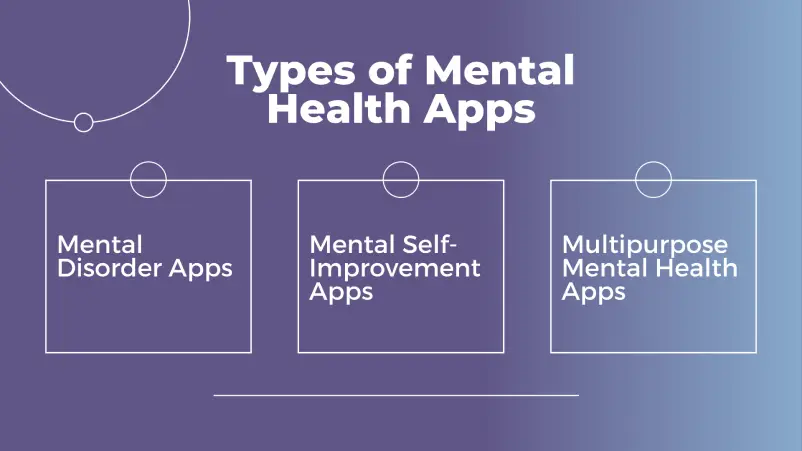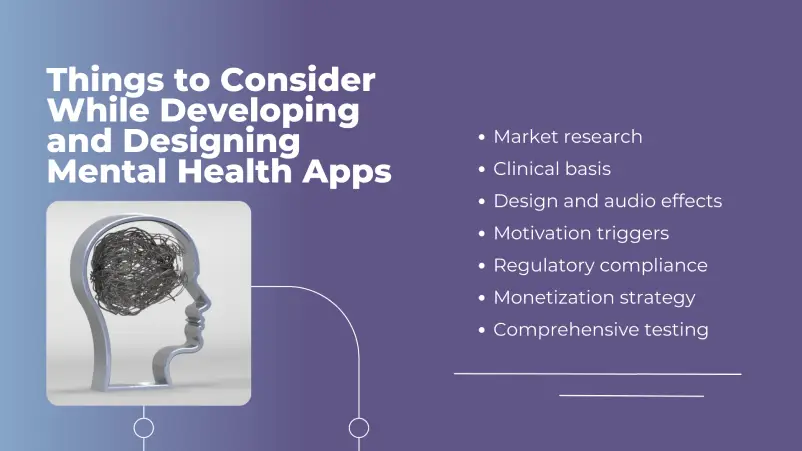Nowadays, people take their mental health more seriously. High workloads, unstable political and economical situations, heartbreaks, pandemics - each of us faces certain challenges every now and then, and sometimes it is difficult to overcome emotional tension on one’s own. So, counseling services are in high demand these days. The rapid development of telemedicine has also had an impact by giving rise to numerous mental health applications offering remote professional healthcare services to individuals suffering from the most diverse mental disorders.
Still, it is worth mentioning that today the vast majority of mental health apps lack scientific rigor. Consequently, you can succeed with a mental health app having a solid scientific base. Have you got interested in this? Let’s go into the nitty-gritty.
What is a Mental Health App?
Mental health apps are a type of eHealth application helping to deal with various issues related to mental health and wellbeing. These applications concentrate on a particular type of mental disorder or various areas of wellness like sleep, relaxation, bad habit breaking, stress management, etc. As a rule, applications of this kind offer self-help tools, mood monitoring, therapeutic activities, and remote treatment provided by professional mental health counselors.
Freud, probably, would turn over in his grave, if he knew about this way to treat mental disorders. In essence, there are many debates about the effectiveness of such apps. Still, it is important to understand that while evidence-based mental health apps can be indeed helpful, they still cannot replace traditional treatment especially when it comes to serious mental disorders.
Anyway, advanced mental health apps have numerous advantages that make them attractive for people. Let's consider the most prominent benefits:
Since applications of this kind provide convenient remote therapy delivery, they are spot-on for people who do not have other options for some reason.
Some people constantly postpone visiting a mental health specialist due to their shyness and a fear that their health problems will be out in the open. Mental health apps provide anonymity and allow people to get useful information and receive healthcare services in a secure way. For example, even an icon of such apps can be customized in order not to reveal the aim of the installed application.
Mental health apps can be easily used any time, at any place, and on any mobile device. All these make them extremely convenient, especially for busy people being on the go all the time.
Mental health apps can be an amusing way to take care of mental health. To make people stay engaged, these applications often enable them to set daily reminders. Moreover, gamification is also widely used for this purpose.
Overview of the Mental Health App Market
To demonstrate great perspectives of mental health application development to you, we offer to review the state of affairs on the mental health app market.
According to Absolute Markets Insights, in 2018 the global mental health app market accounted for 587.9 million dollars, and by the end of 2027 the revenue is expected to reach 3.918,40 million dollars at a growth rate of 23.7 %. As you see, the figures are rather promising. This can be explained by the increasing stress level caused by social, political, and economical instability, poor social interactions, and proneness to different addictions.
In terms of operating systems, iOS-based mental health applications have the highest revenue. The thing is that most of these applications are used in developed countries where iOS-powered devices have the largest market share. Still, Android-based mental health applications are forecasted to grow as well due to the wide usage of budget-friendly Android-powered devices in developing countries.
Why are Mental Health Apps Sought After?
What stands behind a high demand for mental health apps? Foremost, it is due to society's awareness of mental health importance. While being exposed to numerous stresses, having various addictions, and suffering from different mental diseases, people strive to overcome them in order to live a full-fledged life. Numerous mental health apps come in handy. Some of them help to contact licensed specialists, others are fully humanless. Сhatbots provide rather efficient cognitive behavioral therapy; mood trackers enable people to monitor their emotional state; meditation sessions and breathing exercises help people calm down.
With the help of mental health apps, people get new knowledge about the psyche and ways in which some mental problems can be overcome. Users with severe disorders, in turn, get an opportunity to keep their health state stable, as well as find and reach out to counselors whenever they need help.
All in all, the apps in question cover diverse mental health issues assisting people to improve their quality of life.
Types of Mental Health Apps
Mental health apps tackle diverse issues, and on this basis, they are divided into various types:
Applications of this type are developed exclusively for users with serious mental diseases like eating disorders, manic-depressive psychosis, PTSD, schizophrenia, and others. As a rule, these applications use only well-researched treatment strategies.
Using mental disorder apps, people can feel more confident due to 24/7 online doctor availability. Comprehensive medical monitoring along with regular online consultations make treatment much easier.
Mental Self-Improvement Apps
Self-improvement apps are leveraged to check and monitor general mental state, resolve slight disorders, lead a healthy lifestyle, get motivated, etc. These apps also fall into a few subgroups:
General mental health applications
General mental health applications help to establish self-care through mood control and the implementation of healthy habits. The apps may include diverse features, such as questionnaires, community support, 24/7 chat with licensed psychologists. Numerous self-care tips are aimed at coping with different negative feelings.
Addiction recovery applications
Breaking bad habits on one’s own efforts can be a task beyond one’s strength, so very often people need additional help. Addiction recovery apps offer trackers, reminders, a supportive community, and a ton of useful information.
Anxiety, frustration, and stress are common things in modern society, therefore there are a number of apps tackling these issues. They offer multiple relaxation exercises and efficient motivation plans, providing positive results by making app users feel confident and calm again.
Multipurpose Mental Health Apps
While some applications are designed to help overcome a particular mental disorder, others offer diverse functionality and services tackling a number of mental health issues at once, so anyone can find what they need.
Key Features of Mental Health Apps
From the beginning, it is important to determine the features that a mental health application will provide to end-users. Of course, a final set of features may vary from app to app. Still, we would like to draw your attention to those that are considered to be paramount and that the best mental health apps usually offer:
The ability to get consultations from a licensed specialist is of primary importance especially when it comes to serious mental disorders. Therefore, the implementation of video conferences in an app is definitely a good idea that will be appreciated by doctors and patients.
For mental health apps, it is critical to provide efficient in-app interaction between patients and doctors. Apart from video calls, it makes sense to implement text chats along with audio messaging.
Success journal and daily check-ins
With the help of daily check-ins and journals, app users can monitor their mood changes, stress level, adherence to a defined meal plan, etc. In such a way it is easier to track success and evaluate a current health state.
This feature would be helpful for addiction recovery apps as it allows addicts to monitor their spending behavior which also contributes to efficient treatment.
Notifications are essential for regular schedule establishment and self-monitoring encouragement. Such notifications may remind about upcoming doctor appointments and calls, medicine takings, relaxation or meditation sessions, and journal records. Additionally, notifications can also inform about special offers and updates. Yet, be cautious as an excessive number of notifications may annoy users.
Implement filters that will help users quickly find in-app counselors meeting all their requirements.
A person fighting against a mental disorder may feel lonesome and frustrated as nobody in their social environment can understand them. In these terms, an in-app support group is very helpful by providing communication with people facing the same problem. Staying anonymous users may share their experience and motivate each other. It also gives a sense of belonging and cohesiveness that aids in users’ emotional state.
Apps for mental health professionals usually have a therapy dashboard as it helps counselors to manage cases and keep track of patients’ success. Having patient data systemized, counselors can provide accurate treatment and reach desired results in a short time period
It is important to provide an easy sign-up while getting all the vital data such as surname, name, email, and telephone number, All in all, for signing up, it is advised to find a happy medium between convenience and security.
On successful registration, app users should fill in a form in order to provide detailed information on age, gender, health state, etc. If an app suggests in-app consultations, doctors also should have comprehensive profiles letting app users choose specialists that match their needs.
Some interactive games can positively impact cognitive skills and ease tension. They can be added to everyday routine, boosting user loyalty. In such a way, mental care can be fun. So consider this while designing your mental health app.
Of course, different relaxation techniques, meditations, mood tracking, and professional medical support are very important. Still, it is also a good idea to provide app users with additional educational information on related topics, from particular mental diseases to well-being in general.
Things to Consider While Developing and Designing Mental Health Apps
To create a mental health application that will be well accepted by users, it is advised to consider the following things:
As soon as you decide on a type of mental health application that you would like to develop, it is necessary to conduct market research. Thoroughly examine and analyze similar apps available on the market, reveal their weaknesses and strengths. Market research is the best way to assess your rivals and uncover users’ needs and expectations. Received insights will help you understand whether your idea is indeed good or to find ways in which you can improve it.
To take off, your app should be developed on the basis of tried and tested techniques that licensed psychologists use for the treatment of mental disorders. Consequently, we strongly recommend you engage subject matter experts from the project outset till the completion of the development process.
Standards of UI/UX design for mental health apps suggest simplicity and minimalism. There should not be sophisticated elements and violent colors as they may cause disorder exacerbation. In addition, pay attention to audio effects and avoid loud and sharp sounds.
Design a mental health app with motivation triggers in mind. Some rewards like digital coins, stickers, and badges motivate users and make them feel better. Gamification also encourages app users to complete tasks that they feel unconfident about.
As any healthcare application, mental health applications collecting and storing users’ sensitive health data should comply with state norms and regulations (e.g. HIPAA, PIPEDA, GDPR), defining data protection standards. This is because security is of primary importance when it comes to healthcare applications. So design and develop your mental health app checking its compliance with corresponding regulations and with all the recommended security measures in mind.
It is obvious that the main aim of any developed application is to bring income. So, from the very beginning, you should opt for a suitable monetization strategy. You can consider subscription, freemium, or in-app ads.
While testing is an essential stage of software development, we are tireless to repeat again and again that it is indeed a must especially when it comes to healthcare apps. Users expect the highest level of quality from mental health support apps, and you just cannot take a risk by neglecting comprehensive testing. Engage a professional QA team from the early stages of software development and ensure a sound QA workflow.
Conclusion
Mental health application is a very specific software product. Working on its development and design you should take into account not only technical aspects but also relevance and efficiency of the offered treatment techniques, security, regulatory compliance, motivation triggers, and many others. To succeed you should build a team consisting of brilliant developers, professional UI/UX designers, seasoned QA engineers, and subject matter experts.






